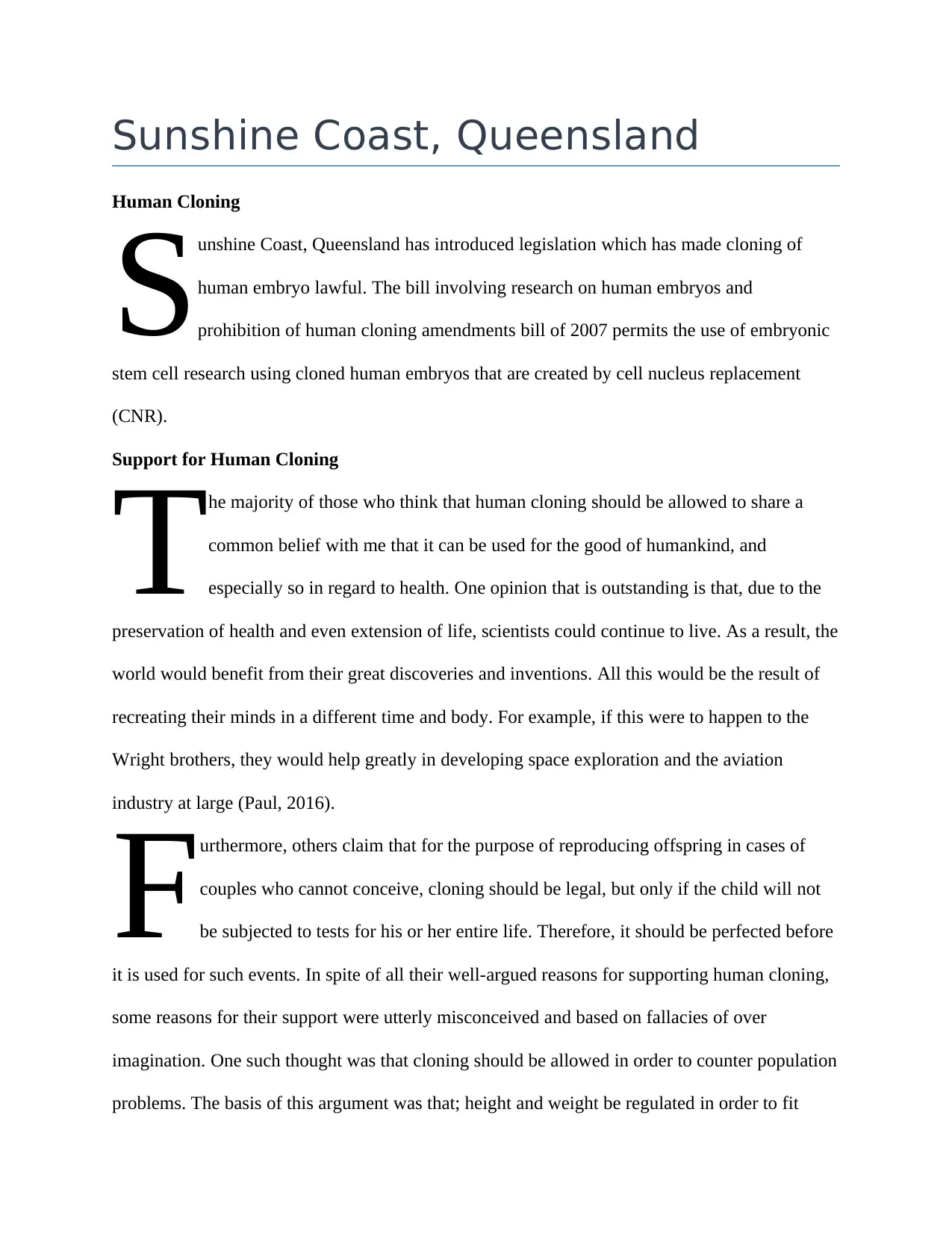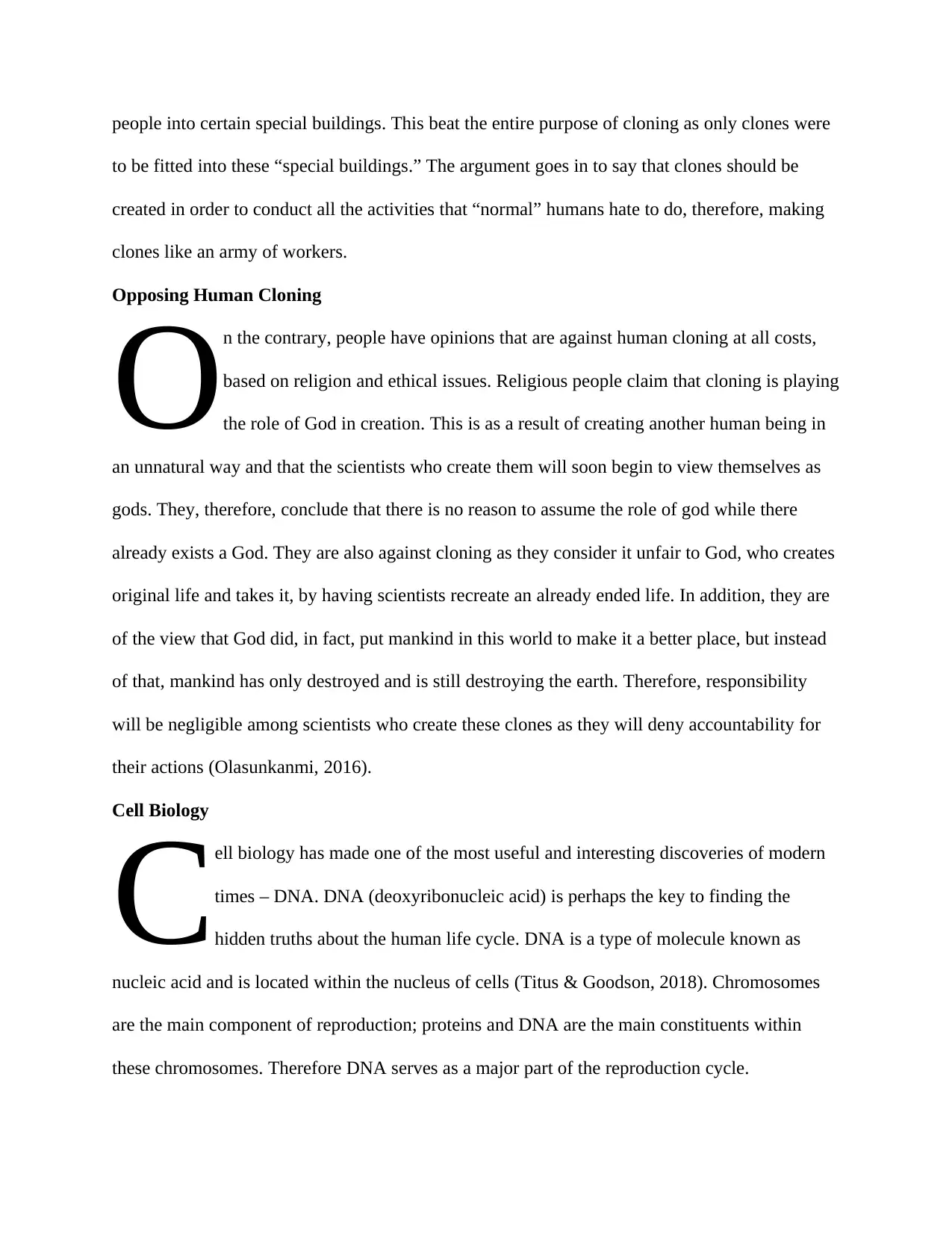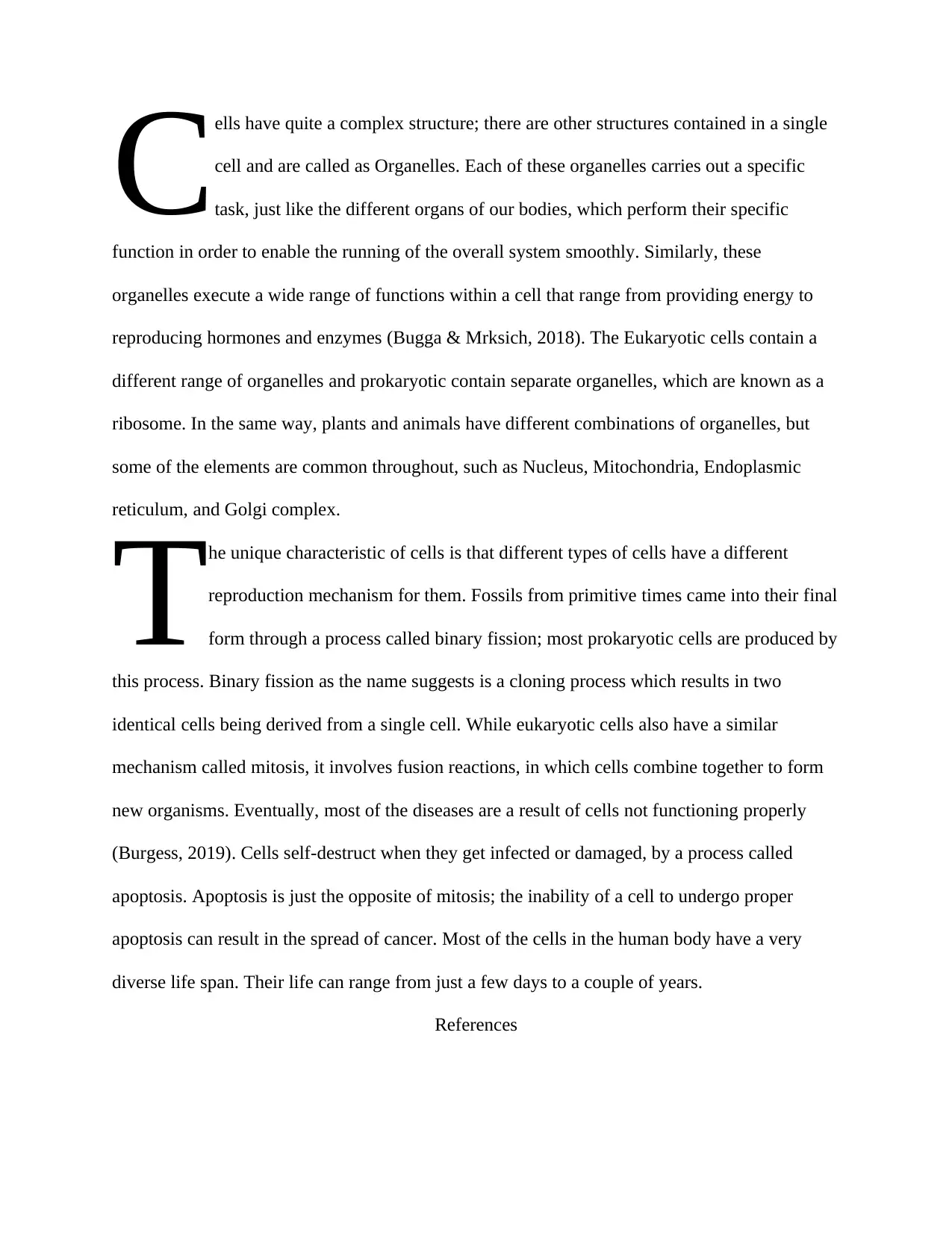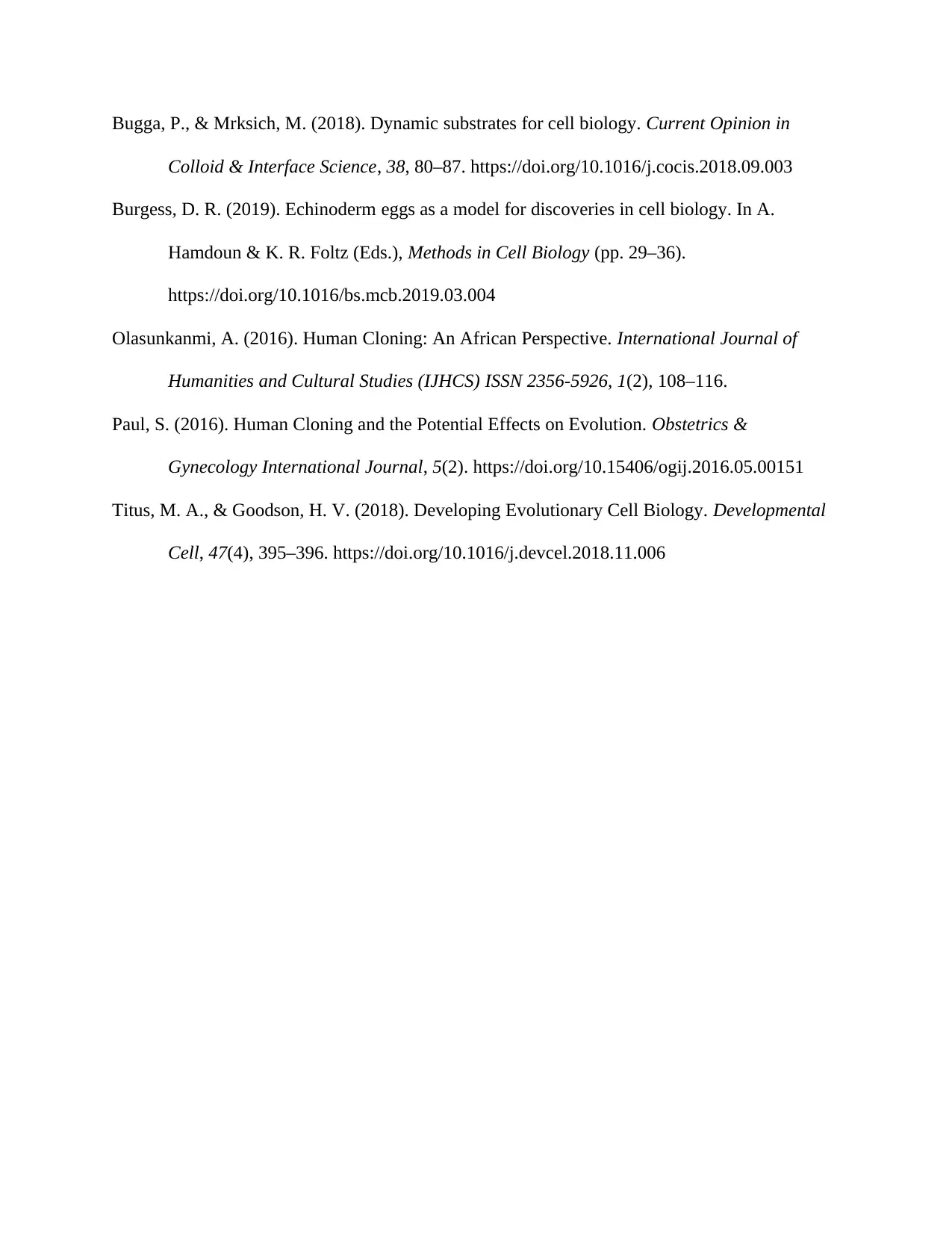Human Cloning: Support and Opposition
VerifiedAdded on 2023/01/18
|4
|1176
|93
AI Summary
This article discusses the support and opposition towards human cloning, including its potential benefits for health and reproduction, as well as the ethical and religious concerns. It also provides an overview of cell biology and the role of DNA in reproduction.
Contribute Materials
Your contribution can guide someone’s learning journey. Share your
documents today.

Sunshine Coast, Queensland
Human Cloning
unshine Coast, Queensland has introduced legislation which has made cloning of
human embryo lawful. The bill involving research on human embryos and
prohibition of human cloning amendments bill of 2007 permits the use of embryonic
stem cell research using cloned human embryos that are created by cell nucleus replacement
(CNR).
S
Support for Human Cloning
he majority of those who think that human cloning should be allowed to share a
common belief with me that it can be used for the good of humankind, and
especially so in regard to health. One opinion that is outstanding is that, due to the
preservation of health and even extension of life, scientists could continue to live. As a result, the
world would benefit from their great discoveries and inventions. All this would be the result of
recreating their minds in a different time and body. For example, if this were to happen to the
Wright brothers, they would help greatly in developing space exploration and the aviation
industry at large (Paul, 2016).
T
urthermore, others claim that for the purpose of reproducing offspring in cases of
couples who cannot conceive, cloning should be legal, but only if the child will not
be subjected to tests for his or her entire life. Therefore, it should be perfected before
it is used for such events. In spite of all their well-argued reasons for supporting human cloning,
some reasons for their support were utterly misconceived and based on fallacies of over
imagination. One such thought was that cloning should be allowed in order to counter population
problems. The basis of this argument was that; height and weight be regulated in order to fit
F
Human Cloning
unshine Coast, Queensland has introduced legislation which has made cloning of
human embryo lawful. The bill involving research on human embryos and
prohibition of human cloning amendments bill of 2007 permits the use of embryonic
stem cell research using cloned human embryos that are created by cell nucleus replacement
(CNR).
S
Support for Human Cloning
he majority of those who think that human cloning should be allowed to share a
common belief with me that it can be used for the good of humankind, and
especially so in regard to health. One opinion that is outstanding is that, due to the
preservation of health and even extension of life, scientists could continue to live. As a result, the
world would benefit from their great discoveries and inventions. All this would be the result of
recreating their minds in a different time and body. For example, if this were to happen to the
Wright brothers, they would help greatly in developing space exploration and the aviation
industry at large (Paul, 2016).
T
urthermore, others claim that for the purpose of reproducing offspring in cases of
couples who cannot conceive, cloning should be legal, but only if the child will not
be subjected to tests for his or her entire life. Therefore, it should be perfected before
it is used for such events. In spite of all their well-argued reasons for supporting human cloning,
some reasons for their support were utterly misconceived and based on fallacies of over
imagination. One such thought was that cloning should be allowed in order to counter population
problems. The basis of this argument was that; height and weight be regulated in order to fit
F
Secure Best Marks with AI Grader
Need help grading? Try our AI Grader for instant feedback on your assignments.

people into certain special buildings. This beat the entire purpose of cloning as only clones were
to be fitted into these “special buildings.” The argument goes in to say that clones should be
created in order to conduct all the activities that “normal” humans hate to do, therefore, making
clones like an army of workers.
Opposing Human Cloning
n the contrary, people have opinions that are against human cloning at all costs,
based on religion and ethical issues. Religious people claim that cloning is playing
the role of God in creation. This is as a result of creating another human being in
an unnatural way and that the scientists who create them will soon begin to view themselves as
gods. They, therefore, conclude that there is no reason to assume the role of god while there
already exists a God. They are also against cloning as they consider it unfair to God, who creates
original life and takes it, by having scientists recreate an already ended life. In addition, they are
of the view that God did, in fact, put mankind in this world to make it a better place, but instead
of that, mankind has only destroyed and is still destroying the earth. Therefore, responsibility
will be negligible among scientists who create these clones as they will deny accountability for
their actions (Olasunkanmi, 2016).
O
Cell Biology
ell biology has made one of the most useful and interesting discoveries of modern
times – DNA. DNA (deoxyribonucleic acid) is perhaps the key to finding the
hidden truths about the human life cycle. DNA is a type of molecule known as
nucleic acid and is located within the nucleus of cells (Titus & Goodson, 2018). Chromosomes
are the main component of reproduction; proteins and DNA are the main constituents within
these chromosomes. Therefore DNA serves as a major part of the reproduction cycle.
C
to be fitted into these “special buildings.” The argument goes in to say that clones should be
created in order to conduct all the activities that “normal” humans hate to do, therefore, making
clones like an army of workers.
Opposing Human Cloning
n the contrary, people have opinions that are against human cloning at all costs,
based on religion and ethical issues. Religious people claim that cloning is playing
the role of God in creation. This is as a result of creating another human being in
an unnatural way and that the scientists who create them will soon begin to view themselves as
gods. They, therefore, conclude that there is no reason to assume the role of god while there
already exists a God. They are also against cloning as they consider it unfair to God, who creates
original life and takes it, by having scientists recreate an already ended life. In addition, they are
of the view that God did, in fact, put mankind in this world to make it a better place, but instead
of that, mankind has only destroyed and is still destroying the earth. Therefore, responsibility
will be negligible among scientists who create these clones as they will deny accountability for
their actions (Olasunkanmi, 2016).
O
Cell Biology
ell biology has made one of the most useful and interesting discoveries of modern
times – DNA. DNA (deoxyribonucleic acid) is perhaps the key to finding the
hidden truths about the human life cycle. DNA is a type of molecule known as
nucleic acid and is located within the nucleus of cells (Titus & Goodson, 2018). Chromosomes
are the main component of reproduction; proteins and DNA are the main constituents within
these chromosomes. Therefore DNA serves as a major part of the reproduction cycle.
C

ells have quite a complex structure; there are other structures contained in a single
cell and are called as Organelles. Each of these organelles carries out a specific
task, just like the different organs of our bodies, which perform their specific
function in order to enable the running of the overall system smoothly. Similarly, these
organelles execute a wide range of functions within a cell that range from providing energy to
reproducing hormones and enzymes (Bugga & Mrksich, 2018). The Eukaryotic cells contain a
different range of organelles and prokaryotic contain separate organelles, which are known as a
ribosome. In the same way, plants and animals have different combinations of organelles, but
some of the elements are common throughout, such as Nucleus, Mitochondria, Endoplasmic
reticulum, and Golgi complex.
C
he unique characteristic of cells is that different types of cells have a different
reproduction mechanism for them. Fossils from primitive times came into their final
form through a process called binary fission; most prokaryotic cells are produced by
this process. Binary fission as the name suggests is a cloning process which results in two
identical cells being derived from a single cell. While eukaryotic cells also have a similar
mechanism called mitosis, it involves fusion reactions, in which cells combine together to form
new organisms. Eventually, most of the diseases are a result of cells not functioning properly
(Burgess, 2019). Cells self-destruct when they get infected or damaged, by a process called
apoptosis. Apoptosis is just the opposite of mitosis; the inability of a cell to undergo proper
apoptosis can result in the spread of cancer. Most of the cells in the human body have a very
diverse life span. Their life can range from just a few days to a couple of years.
T
References
cell and are called as Organelles. Each of these organelles carries out a specific
task, just like the different organs of our bodies, which perform their specific
function in order to enable the running of the overall system smoothly. Similarly, these
organelles execute a wide range of functions within a cell that range from providing energy to
reproducing hormones and enzymes (Bugga & Mrksich, 2018). The Eukaryotic cells contain a
different range of organelles and prokaryotic contain separate organelles, which are known as a
ribosome. In the same way, plants and animals have different combinations of organelles, but
some of the elements are common throughout, such as Nucleus, Mitochondria, Endoplasmic
reticulum, and Golgi complex.
C
he unique characteristic of cells is that different types of cells have a different
reproduction mechanism for them. Fossils from primitive times came into their final
form through a process called binary fission; most prokaryotic cells are produced by
this process. Binary fission as the name suggests is a cloning process which results in two
identical cells being derived from a single cell. While eukaryotic cells also have a similar
mechanism called mitosis, it involves fusion reactions, in which cells combine together to form
new organisms. Eventually, most of the diseases are a result of cells not functioning properly
(Burgess, 2019). Cells self-destruct when they get infected or damaged, by a process called
apoptosis. Apoptosis is just the opposite of mitosis; the inability of a cell to undergo proper
apoptosis can result in the spread of cancer. Most of the cells in the human body have a very
diverse life span. Their life can range from just a few days to a couple of years.
T
References

Bugga, P., & Mrksich, M. (2018). Dynamic substrates for cell biology. Current Opinion in
Colloid & Interface Science, 38, 80–87. https://doi.org/10.1016/j.cocis.2018.09.003
Burgess, D. R. (2019). Echinoderm eggs as a model for discoveries in cell biology. In A.
Hamdoun & K. R. Foltz (Eds.), Methods in Cell Biology (pp. 29–36).
https://doi.org/10.1016/bs.mcb.2019.03.004
Olasunkanmi, A. (2016). Human Cloning: An African Perspective. International Journal of
Humanities and Cultural Studies (IJHCS) ISSN 2356-5926, 1(2), 108–116.
Paul, S. (2016). Human Cloning and the Potential Effects on Evolution. Obstetrics &
Gynecology International Journal, 5(2). https://doi.org/10.15406/ogij.2016.05.00151
Titus, M. A., & Goodson, H. V. (2018). Developing Evolutionary Cell Biology. Developmental
Cell, 47(4), 395–396. https://doi.org/10.1016/j.devcel.2018.11.006
Colloid & Interface Science, 38, 80–87. https://doi.org/10.1016/j.cocis.2018.09.003
Burgess, D. R. (2019). Echinoderm eggs as a model for discoveries in cell biology. In A.
Hamdoun & K. R. Foltz (Eds.), Methods in Cell Biology (pp. 29–36).
https://doi.org/10.1016/bs.mcb.2019.03.004
Olasunkanmi, A. (2016). Human Cloning: An African Perspective. International Journal of
Humanities and Cultural Studies (IJHCS) ISSN 2356-5926, 1(2), 108–116.
Paul, S. (2016). Human Cloning and the Potential Effects on Evolution. Obstetrics &
Gynecology International Journal, 5(2). https://doi.org/10.15406/ogij.2016.05.00151
Titus, M. A., & Goodson, H. V. (2018). Developing Evolutionary Cell Biology. Developmental
Cell, 47(4), 395–396. https://doi.org/10.1016/j.devcel.2018.11.006
1 out of 4
![[object Object]](/_next/static/media/star-bottom.7253800d.svg)